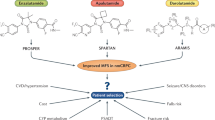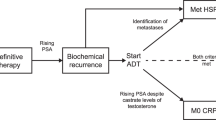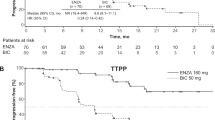Abstract
Over the past few years, we have developed an increased understanding of the molecular mechanisms that underlie prostate cancer progression and castration resistance and expanded our repertoire of therapeutic options for castration-resistant prostate cancer (CRPC). Four new agents (cabazitaxel, abiraterone acetate, enzalutamide, and radium-233) have been shown to prolong overall survival in patients with CRPC in the postchemotherapy setting. Targeting the androgen receptor pathway continues to have an important role in the treatment of CRPC, with abiraterone acetate and enzalutamide being the most exciting developments. Cabazitaxel is now considered the standard-of-care second-line chemotherapy for men with metastatic CRPC (mCRPC). Bone-targeted therapy is an active area of research, with denosumab being the first bone-targeted agent able to significantly delay the appearance of bone metastases in patients with CRPC and radium-223 being the first radiopharmaceutical agent to improve survival in patients with mCRPC.
Key Points
-
The androgen receptor (AR) pathway remains a therapeutic target in patients with castration-resistant prostate cancer (CRPC)
-
Abiraterone acetate, a selective CYP17 inhibitor, has been approved by the FDA for the treatment of patients with metastatic CRPC (mCRPC) in prechemotherapy and postchemotherapy settings
-
Enzalutamide (formerly known as MDV3100) is a multilevel AR inhibitor that has gained FDA approval for the treatment of patients with mCRPC who have already received docetaxel therapy
-
Cabazitaxel, a taxane-based chemotherapeutic agent, is FDA-approved for patients who progress on, or after, docetaxel regimens
-
Denosumab was the first osteoclast-targeted agent shown to significantly delay bone metastasis in patients with nonmetastatic CRPC
-
Radium-223 was the first radiopharmaceutical agent shown to improve survival in patients with mCRPC
This is a preview of subscription content, access via your institution
Access options
Subscribe to this journal
Receive 12 print issues and online access
$209.00 per year
only $17.42 per issue
Buy this article
- Purchase on Springer Link
- Instant access to full article PDF
Prices may be subject to local taxes which are calculated during checkout

Similar content being viewed by others
References
Mohler, J. L. et al. The androgen axis in recurrent prostate cancer. Clin. Cancer Res. 10, 440–448 (2004).
Hotte, S. J. & Saad, F. Current management of castrate-resistant prostate cancer. Curr. Oncol. 17 (Suppl. 2), S72–S79 (2010).
Petrylak, D. P. et al. Docetaxel and estramustine compared with mitoxantrone and prednisone for advanced refractory prostate cancer. N. Engl. J. Med. 351, 1513–1520 (2004).
Tannock, I. F. et al. Docetaxel plus prednisone or mitoxantrone plus prednisone for advanced prostate cancer. N. Engl. J. Med. 351, 1502–1512 (2004).
Debes, J. D. & Tindall, D. J. Mechanisms of androgen-refractory prostate cancer. N. Engl. J. Med. 351, 1488–1490 (2004).
Friedlander, T. W. et al. Common structural and epigenetic changes in the genome of castration-resistant prostate cancer. Cancer Res. 72, 616–625 (2012).
Fenton, M. A. et al. Functional characterization of mutant androgen receptors from androgen-independent prostate cancer. Clin. Cancer Res. 3, 1383–1388 (1997).
Hu, R. et al. Ligand-independent androgen receptor variants derived from splicing of cryptic exons signify hormone-refractory prostate cancer. Cancer Res. 69, 16–22 (2009).
Li, Y. et al. Intragenic rearrangement and altered RNA splicing of the androgen receptor in a cell-based model of prostate cancer progression. Cancer Res. 71, 2108–2117 (2011).
Ueda, T., Bruchovsky, N. & Sadar, M. D. Activation of the androgen receptor N-terminal domain by interleukin-6 via MAPK and STAT3 signal transduction pathways. J. Biol. Chem. 277, 7076–7085 (2002).
Rocchi, P. et al. Heat shock protein 27 increases after androgen ablation and plays a cytoprotective role in hormone-refractory prostate cancer. Cancer Res. 64, 6595–6602 (2004).
Asim, M., Siddiqui, I. A., Hafeez, B. B., Baniahmad, A. & Mukhtar, H. Src kinase potentiates androgen receptor transactivation function and invasion of androgen-independent prostate cancer C42 cells. Oncogene 27, 3596–3604 (2008).
Nishiyama, T., Hashimoto, Y. & Takahashi, K. The influence of androgen deprivation therapy on dihydrotestosterone levels in the prostatic tissue of patients with prostate cancer. Clin. Cancer Res. 10, 7121–7126 (2004).
Montgomery, R. B. et al. Maintenance of intratumoral androgens in metastatic prostate cancer: a mechanism for castration-resistant tumour growth. Cancer Res. 68, 4447–4454 (2008).
Sciarra, A., Cardi, A. & Di Silverio, F. Antiandrogen monotherapy: recommendations for the treatment of prostate cancer. Urol. Int. 72, 91–98 (2004).
Cox, R. L. & Crawford, E. D. Oestrogens in the treatment of prostate cancer. J. Urol. 154, 1991–1998 (1995).
Small, E. J. et al. Antiandrogen withdrawal alone or in combination with ketoconazole in androgen-independent prostate cancer patients: a phase III trial (CALGB 9583). J. Clin. Oncol. 22, 1025–1033 (2004).
Sartor, A. O. et al. Antiandrogen withdrawal in castrate-refractory prostate cancer: a Southwest Oncology Group trial (SWOG 9426). Cancer 112, 2393–2400 (2008).
Clemons, J., Glode, L. M., Gao, D. & Flaig, T. W. Low-dose diethylstilbestrol for the treatment of advanced prostate cancer. Urol. Oncol. 31, 198–204 (2013).
Nishimura, K. et al. Potential mechanism for the effects of dexamethasone on growth of androgen-independent prostate cancer. J. Natl Cancer Inst. 93, 1739–1746 (2001).
Yano, A., Fujii, Y., Iwai, A., Kageyama, Y. & Kihara, K. Glucocorticoids suppress tumour angiogenesis and in vivo growth of prostate cancer cells. Clin. Cancer Res. 12, 3003–3009 (2006).
Venkitaraman, R. et al. Efficacy of low-dose dexamethasone in castration-refractory prostate cancer. BJU Int. 101, 440–443 (2008).
Potter, G. A., Barrie, S. E., Jarman, M. & Rowlands, M. G. Novel steroidal inhibitors of human cytochrome P45017 alpha (17 alpha-hydroxylase-C1720-lyase): potential agents for the treatment of prostatic cancer. J. Med. Chem. 38, 2463–2471 (1995).
Fizazi, K. et al. Abiraterone acetate for treatment of metastatic castration-resistant prostate cancer: final overall survival analysis of the COU-AA-301 randomised, double-blind, placebo-controlled phase 3 study. Lancet Oncol. 13, 983–992 (2012).
Ryan, C. J. et al. Abiraterone in metastatic prostate cancer without previous chemotherapy. N. Engl. J. Med. 368, 138–148 (2012).
Tran, C. et al. Development of a second-generation antiandrogen for treatment of advanced prostate cancer. Science 324, 787–790 (2009).
Scher, H. I. et al. Increased survival with enzalutamide in prostate cancer after chemotherapy. N. Engl. J. Med. 367, 1187–1197 (2012).
US National Library of Medicine. ClinicalTrials.gov [online], (2010).
Goldman, B. & DeFrancesco, L. The cancer vaccine roller coaster. Nat. Biotechnol. 27, 129–139 (2009).
Small, E. J. et al. Immunotherapy of hormone-refractory prostate cancer with antigen-loaded dendritic cells. J. Clin. Oncol. 18, 3894–3903 (2000).
Kantoff, P. W. et al. Sipuleucel-T immunotherapy for castration-resistant prostate cancer. N. Engl. J. Med. 363, 411–422 (2010).
Kaufman, H. L. et al. Phase II randomized study of vaccine treatment of advanced prostate cancer (E7897): a trial of the Eastern Cooperative Oncology Group. J. Clin. Oncol. 22, 2122–2132 (2004).
Kantoff, P. W. et al. Overall survival analysis of a phase II randomized controlled trial of a poxviral-based PSA-targeted immunotherapy in metastatic castration-resistant prostate cancer. J. Clin. Oncol. 28, 1099–1105 (2010).
US National Library of Medicine. Clinicaltrial.gov [online], (2011).
Chambers, C. A., Kuhns, M. S., Egen, J. G. & Allison, J. P. CTLA-4-mediated inhibition in regulation of T cell responses: mechanisms and manipulation in tumour immunotherapy. Annu. Rev. Immunol. 19, 565–594 (2001).
Small, E. J. et al. A pilot trial of CTLA-4 blockade with human anti-CTLA-4 in patients with hormone-refractory prostate cancer. Clin. Cancer Res. 13, 1810–1815 (2007).
Fong, L. et al. Potentiating endogenous antitumour immunity to prostate cancer through combination immunotherapy with CTLA4 blockade and GM-CSF. Cancer Res. 69, 609–615 (2009).
Slovin, S. F. et al. Ipilimumab alone or in combination with radiotherapy in metastatic castration-resistant prostate cancer: results from an open-label, multicentre phase I/II study. Ann. Oncol. http://dx.doi.org/10.1093/annonc/mdt107.
US National Library of Medicine. ClinicalTrials.gov [online], (2010).
US National Library of Medicine. ClinicalTrials.gov [online], (2009).
Michels, J., Montemurro, T., Murray, N., Kollmannsberger, C. & Nguyen Chi, K. First- and second-line chemotherapy with docetaxel or mitoxantrone in patients with hormone-refractory prostate cancer: does sequence matter? Cancer 106, 1041–1046 (2006).
Oh, W. K., Manola, J., Babcic, V., Harnam, N. & Kantoff, P. W. Response to second-line chemotherapy in patients with hormone refractory prostate cancer receiving two sequences of mitoxantrone and taxanes. Urology 67, 1235–1240 (2006).
Berthold, D. R., Pond, G. R., de Wit, R., Eisenberger, M. & Tannock, I. F. Survival and PSA response of patients in the TAX 327 study who crossed over to receive docetaxel after mitoxantrone or vice versa. Ann. Oncol. 19, 1749–1753 (2008).
Paller, C. J. & Antonarakis, E. S. Cabazitaxel: a novel second-line treatment for metastatic castration-resistant prostate cancer. Drug Des. Devel. Ther. 5, 117–124 (2011).
de Bono, J. S. et al. Prednisone plus cabazitaxel or mitoxantrone for metastatic castration-resistant prostate cancer progressing after docetaxel treatment: a randomised open-label trial. Lancet 376, 1147–1154 (2010).
Calcagno, F. et al. Safety and efficacy of cabazitaxel in the docetaxel-treated patients with hormone-refractory prostate cancer. Clin. Med. Insights Oncol. 7, 1–12 (2012).
US National Library of Medicine. ClinicalTrials.gov [online], (2011).
US National Library of Medicine. ClinicalTrials.gov [online], (2011).
Eymard, J. C. et al. Docetaxel reintroduction in patients with metastatic castration-resistant docetaxel-sensitive prostate cancer: a retrospective multicentre study. BJU Int. 106, 974–978 (2010).
Schallier, D., Decoster, L., Braeckman, J., Fontaine, C. & Degreve, J. Docetaxel in the treatment of metastatic castration-resistant prostate cancer (mCRPC): an observational study in a single institution. Anticancer Res. 32, 633–641 (2012).
Di Lorenzo, G. et al. Phase II study of docetaxel re-treatment in docetaxel-pretreated castration-resistant prostate cancer. BJU Int. 107, 234–239 (2011).
Loriot, Y. et al. The interval from the last cycle of docetaxel-based chemotherapy to progression is associated with the efficacy of subsequent docetaxel in patients with prostate cancer. Eur. J. Cancer 46, 1770–1772 (2010).
Heck, M. M. et al. Rational indication for docetaxel rechallenge in metastatic castration-resistant prostate cancer. BJU Int. 110, E635–E640 (2012).
Weinfurt, K. P. et al. The significance of skeletal-related events for the health-related quality of life of patients with metastatic prostate cancer. Ann. Oncol. 16, 579–584 (2005).
Diamond, T. H., Higano, C. S., Smith, M. R., Guise, T. A. & Singer, F. R. Osteoporosis in men with prostate carcinoma receiving androgen-deprivation therapy: recommendations for diagnosis and therapies. Cancer 100, 892–899 (2004).
Planas, J. et al. The relationship between daily calcium intake and bone mineral density in men with prostate cancer. BJU Int. 99, 812–816 (2007).
Smith, M. R. et al. Pamidronate to prevent bone loss during androgen-deprivation therapy for prostate cancer. N. Engl. J. Med. 345, 948–955 (2001).
Diamond, T. H. et al. The antiosteoporotic efficacy of intravenous pamidronate in men with prostate carcinoma receiving combined androgen blockade: a double blind, randomized, placebo-controlled crossover study. Cancer 92, 1444–1450 (2001).
Smith, M. R. et al. Randomized controlled trial of zoledronic acid to prevent bone loss in men receiving androgen deprivation therapy for nonmetastatic prostate cancer. J. Urol. 169, 2008–2012 (2003).
Ryan, C. W., Huo, D., Demers, L. M., Beer, T. M. & Lacerna, L. V. Zoledronic acid initiated during the first year of androgen deprivation therapy increases bone mineral density in patients with prostate cancer. J. Urol. 176, 972–978 (2006).
Greenspan, S. L., Nelson, J. B., Trump, D. L. & Resnick, N. M. Effect of once-weekly oral alendronate on bone loss in men receiving androgen deprivation therapy for prostate cancer: a randomized trial. Ann. Intern. Med. 146, 416–424 (2007).
Michaelson, M. D. et al. Randomized controlled trial of annual zoledronic acid to prevent gonadotropin-releasing hormone agonist-induced bone loss in men with prostate cancer. J. Clin. Oncol. 25, 1038–1042 (2007).
Saad, F. et al. A randomized, placebo-controlled trial of zoledronic acid in patients with hormone-refractory metastatic prostate carcinoma. J. Natl Cancer Inst. 94, 1458–1468 (2002).
Saad, F. et al. Long-term efficacy of zoledronic acid for the prevention of skeletal complications in patients with metastatic hormone-refractory prostate cancer. J. Natl Cancer Inst. 96, 879–882 (2004).
Conte, P. & Guarneri, V. Safety of intravenous and oral bisphosphonates and compliance with dosing regimens. Oncologist 9 (Suppl. 4), 28–37 (2004).
Boyle, W. J., Simonet, W. S. & Lacey, D. L. Osteoclast differentiation and activation. Nature 423, 337–342 (2003).
Smith, M. R. et al. Denosumab in men receiving androgen-deprivation therapy for prostate cancer. N. Engl. J. Med. 361, 745–755 (2009).
Fizazi, K. et al. Denosumab versus zoledronic acid for treatment of bone metastases in men with castration-resistant prostate cancer: a randomised, double-blind study. Lancet 377, 813–822 (2011).
Saylor, P. J., Lee, R. J. & Smith, M. R. Emerging therapies to prevent skeletal morbidity in men with prostate cancer. J. Clin. Oncol. 29, 3705–3714 (2011).
Smith, M. R. et al. Denosumab and bone-metastasis-free survival in men with castration-resistant prostate cancer: results of a phase 3, randomised, placebo-controlled trial. Lancet 379, 39–46 (2012).
Hoff, A. O. et al. Frequency and risk factors associated with osteonecrosis of the jaw in cancer patients treated with intravenous bisphosphonates. J. Bone Miner. Res. 23, 826–836 (2008).
Paes, F. M. & Serafini, A. N. Systemic metabolic radiopharmaceutical therapy in the treatment of metastatic bone pain. Semin. Nucl. Med. 40, 89–104 (2010).
Parker, C. et al. Overall survival benefit and safety profile of radium-223 chloride, a first-in-class alpha-pharmaceutical: results from a phase III randomized trial (ALSYMPCA) in patients with castration-resistant prostate cancer (CRPC) with bone metastases. J. Clin. Oncol. 30 (Suppl. 5), a8 (2012).
Sartor, A. O. et al. Radium-223 chloride impact on skeletal-related events in patients with castration-resistant prostate cancer (CRPC) with bone metastases: a phase III randomized trial (ALSYMPCA). J. Clin. Oncol. 30 (Suppl. 5), a4551 (2012).
Antonarakis, E. S. & Eisenberger, M. A. Expanding treatment options for metastatic prostate cancer. N. Engl. J. Med. 364, 2055–2058 (2011).
US National Library of Medicine. ClinicalTrials.gov [online], (2010).
US National Library of Medicine. ClinicalTrials.gov [online], (2010).
US National Library of Medicine. ClinicalTrials.gov [online], (2008).
US National Library of Medicine. ClinicalTrials.gov [online], (2010).
US National Library of Medicine. ClinicalTrials.gov [online], (2010).
US National Library of Medicine. ClinicalTrials.gov [online], (2012).
US National Library of Medicine. ClinicalTrials.gov [online], (2010).
US National Library of Medicine. ClinicalTrials.gov [online], (2012).
US National Library of Medicine. ClinicalTrials.gov [online], (2012).
Author information
Authors and Affiliations
Contributions
M. Bishr researched the literature for this Review. Both authors wrote, edited, discussed, and reviewed the manuscript prior to submission.
Corresponding author
Ethics declarations
Competing interests
F. Saad has been paid for consultancy and research by Astellas, Janssen, Sanofi, Amgen, Novartis, and Bayer. M. Bishr declares no competing interests.
Rights and permissions
About this article
Cite this article
Bishr, M., Saad, F. Overview of the latest treatments for castration-resistant prostate cancer. Nat Rev Urol 10, 522–528 (2013). https://doi.org/10.1038/nrurol.2013.137
Published:
Issue Date:
DOI: https://doi.org/10.1038/nrurol.2013.137
This article is cited by
-
A first-in-class HBO1 inhibitor WM-3835 inhibits castration-resistant prostate cancer cell growth in vitro and in vivo
Cell Death & Disease (2023)
-
MicroRNAs as potential therapeutics to enhance chemosensitivity in advanced prostate cancer
Scientific Reports (2018)
-
Phase 2 study of circulating microRNA biomarkers in castration-resistant prostate cancer
British Journal of Cancer (2017)
-
The role of GATA2 in lethal prostate cancer aggressiveness
Nature Reviews Urology (2017)
-
Role of 20-Hydroxyeicosatetraenoic Acid (20-HETE) in Androgen-Mediated Cell Viability in Prostate Cancer Cells
Hormones and Cancer (2017)



